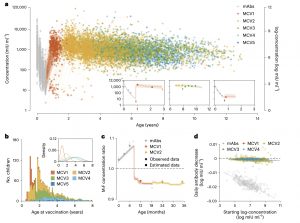A recent study reveals a crucial factor for ensuring measles immunity in children: the delivery method (Figure 1). The research suggests that a single dose of the measles vaccine may be up to 2.6 times less effective in children born by C-section compared to those born vaginally.

Figure 1: Measles IgG antibody concentrations and age at vaccination. a, Maternally derived and MCV-induced measles antibody concentrations (mIU ml−1) measured using ELISA assay. Coloured points connected by a line represent each individual’s antibody concentrations measured longitudinally from baseline to last follow-up, where colours indicate the number of MCV doses received and grey represents maternal antibodies (mAbs). The three insets show examples of modelled concentration responses for three participants where coloured lines and ribbons show the median and 95% credible intervals for model-estimated concentrations, and the coloured arrows represent the timing of MCV doses. The colour of each point, line and arrow indicates maternal or dose-specific concentrations. b, Vaccination ages by different vaccine doses. Inset: the density distribution of vaccination ages. c, Male:female concentration ratio. The points with error bars show the measured male:female concentration ratio and its 95% confidence interval for individuals aged 0, 3, 6, 12, 24 and 36 months of age, comprising 350, 350, 99, 136, 82 and 116 individuals, respectively. The squares are the modelled daily male:female concentration ratios for the 350 individuals with post-vaccination antibody measurements. The solid line, which
is centred within the shaded area, denotes the mean male:female concentration ratio fitted with a generalized additive model. The shaded area covers the 95% CI. The horizontal black dashed line indicates a male:female concentration ratio of 1. d, Daily decreases in log-concentration (log mIU ml −1) for maternal antibodies and following different vaccine doses. The points show the measured log concentrations and their mean daily decrease. The grey and dark blue lines show the relationship between the modelled starting log-concentrations and their mean daily decrease fitted with generalized additive models. MCV1–5, post-dose 1–5.
Measles is a highly contagious disease, and even low vaccine failure rates can trigger outbreaks. This study highlights a potential vulnerability in children born by C-section, who may require a stricter vaccination schedule to guarantee measles protection. A single dose of the vaccine may not be sufficient for these children to develop the necessary antibodies to fight the disease.
Researchers believe the gut microbiome, a vast community of microbes residing in the intestines, plays a role in this phenomenon. Vaginal delivery exposes newborns to a wider variety of maternal microbes, potentially boosting their immune system development. C-section births, on the other hand, may limit this crucial exposure, hindering the maturation of the gut microbiome and its ability to support a robust immune response to vaccines like measles.
The good news is that a second dose of the measles vaccine effectively generates strong immunity in C-section babies. The study found that while 12% of children born by C-section lacked an immune response after the first dose (compared to 5% of vaginally delivered babies), most went on to develop immunity after the second dose.
This research emphasizes the critical importance of ensuring all children, especially those born by C-section, receive both doses of the measles vaccine. Incomplete vaccination not only leaves individual children vulnerable but also increases the risk of outbreaks within communities.
The study highlights a broader concern: the global decline in vaccination rates. Encouraging complete vaccination schedules and addressing potential vulnerabilities like those identified in C-section births are crucial steps in protecting children and communities from measles.
Journal article: Wang, W., et al., 2024. Dynamics of measles immunity from birth and following vaccination. Nature Microbiology.
Summary by Stefan Botha










